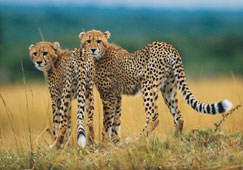South Africa's tourism sector set to grow
25 May 2015
Improved competitiveness and significant government support have strengthened
South Africa's claim to be the leading sub-Saharan tourism destination, though new
visa regulations and fallout from anti-immigrant protests could affect its appeal in
the short term.
In its latest global Travel and Tourism Competitiveness Index report, the World
Economic Forum (WEF) found that South Africa's performance in the tourism sector
had improved significantly since 2013, when the previous study was conducted. The
report, released on May 6, ranked South Africa as the leading country in sub-
Saharan Africa in terms of competitiveness and growth drivers, and 48th out of the
141 markets assessed overall.
While the report underscored the need for improvements in some areas such as
security, these weaknesses were outweighed by the country's natural and cultural
attractions. These include the strong tourism infrastructure – in part a legacy of
the
2010 World Cup – and the industry's business environment, which was rated as a
powerful enabler for the sector.
The meetings, incentives, conferences and exhibitions segment in particular is a big
driver. South Africa hosts over 100 conferences a year thanks to its three leading
convention centres in Cape Town, Johannesburg and Durban, including major
international events. It will, for example, host the WEF Africa 2015 from 3 to 5 June
in Cape Town.
South Africa jumped two rungs in the 2015 survey, displacing the Seychelles atop
the WEF's sub-Saharan rankings. The improved ranking was in part a reflection of
the high level of government support for the travel and tourism industry and the
country's effective marketing strategy, which had helped build South Africa as a
brand, the report said.
Bracing for shockwaves
Though the WEF's report saw a general improvement in the South African tourism
industry, the sector could face
constraints that may hinder the pace of growth in the
short to medium term.
A recent wave of attacks targeting citizens of other African countries living in South
Africa has damaged the nation's image in the region and beyond. A number of
countries, including the UK, the US, Australia and China, have issued travel
advisories warning of the potential for unrest. At present, some 70% of inbound
tourists come from other African countries, according to a report issued by
Statistics South Africa in late March.
Similarly, a decision by the Department of Home Affairs in 2014 to tighten up the
visa application process has seen a plunge in arrivals from key markets such as
India and China.
The new regulations will require tourists to apply in person for visas, whereas
previously many were able to do so though their travel agent. With just two offices
handling visas in China, obtaining one will entail extended travel for many potential
visitors and
additional costs. The same concerns apply to India, where limited
access points to submit applications and increased visa costs are seen as a
disincentive to travel to South Africa.
Arrivals from both India and China saw a sharp downturn in the fourth quarter of
2014, dropping 15% and 50%, respectively, a trend that is expected to accelerate
with the introduction of the requirement that all applications for visas for children
be accompanied by an unabridged birth certificate. While aimed at halting the
trafficking of children, it also has implications for the tourism sector, making it
more complex for travelling families to meet visa requirements.
Effect on operators
Although there are some factors working in favour of the sector, such as the
weaker rand, which is making South Africa a cheaper destination internationally,
the decline in arrivals from some of the largest emerging markets is a cause for
concern for local tourism
operators.
According to Carla da Silva, acting chairman of the Board of Airline Representatives
of South Africa and regional manager for Southern Africa of Air Mauritius, the new
visa regulations could potentially slow growth in the tourism industry and reduce air
service to South Africa. "Airlines will not be able to afford material drops in
passenger numbers on routes already operating on thin margins," she told Oxford
Business Group.
Marcel von Aulock, the chief executive of the gaming and hotels group Tsogo Sun,
said the new visa regime could see the sector miss out on the growing Asian
market. "This is being hampered by the changes in visa restrictions," Von Aulock
told Oxford Business Group. "In order to unlock the massive outbound tourism
numbers that you can get from China, the existing visa regime is just not going to
work; it must change."
The tourism minister, Derek Hanekom, acknowledged in May that the visa
regulations had
negatively impacted foreign tourist arrivals, noting that talks were
under way within the government to address the issue.
However, in spite of the challenges posed by the visa changes and the anti-
immigrant protests, South Africa's tourism industry is still forecast to post solid
growth this year – a crucial performance given the headwinds the economy is
facing. According to the World Travel and Tourism Council, the tourism sector
should expand by 3.4% in 2015, well above the 2% growth predicted for the
broader economy.
Perhaps most important given South Africa's need to increase job creation, the
council said employment levels in the sector were set to rise from last year’s 1.5
million, with travel and tourism positioned to add another 500 000 jobs over the
coming decade.
Source: South Africa Year in Review 2014: This information is provided
by the Oxford
Business Group, the global publishing, research and consultancy firm.
 The cheetah: the world's fastest land animal, and South Africa's second-most endangered carnivore after the wild dog. (Image: Philip van den Berg, South African Tourism)
The cheetah: the world's fastest land animal, and South Africa's second-most endangered carnivore after the wild dog. (Image: Philip van den Berg, South African Tourism)
 Whatever you're looking for, it's right here in South Africa (Image: GCIS)
Whatever you're looking for, it's right here in South Africa (Image: GCIS)









